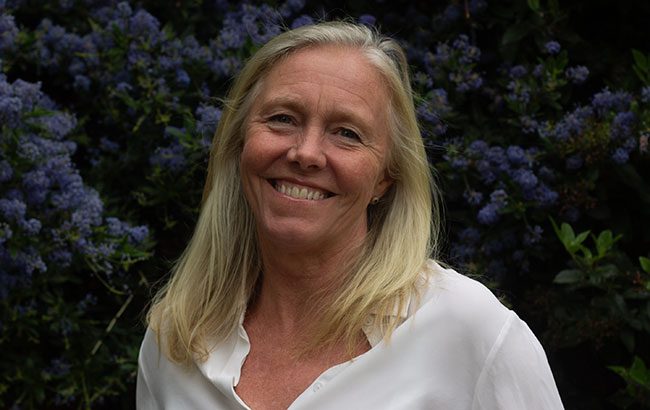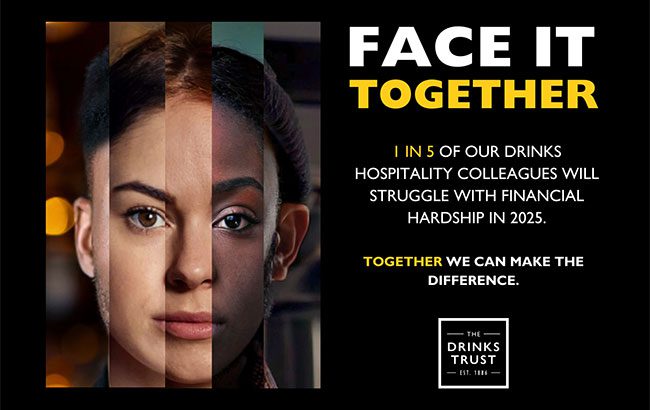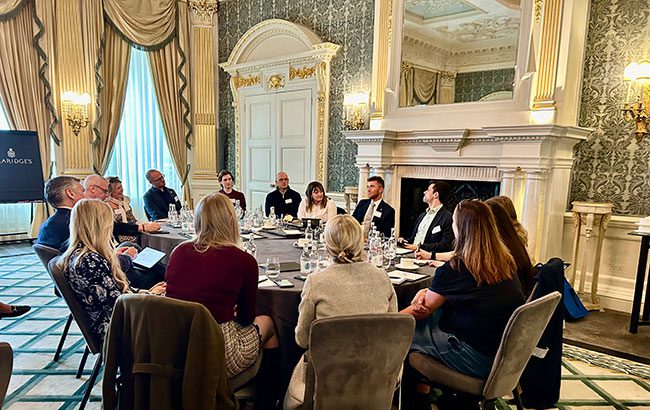The big interview: Nicola Burston, The Drinks Trust
By Melita KielyNicola Burston, CEO of The Drinks Trust, shares the challenges of steering the charity through a turbulent period.

*This feature was originally published in the October 2025 issue of The Spirits Business magazine.
“I talked to someone two weeks ago who lost his job and his home in the same week because his landlord decided to sell, and that was it,” says Nicola Burston, CEO of industry charity The Drinks Trust. “He was desperately trying to find a new place but because he lost his job, getting the references to find a new place was really difficult. And it’s going to get a lot worse, unfortunately.”
It’s a bleak but unfortunately realistic snapshot into the current state of the world. The cost‐of‐living crisis has been infiltrating homes and headlines for the past couple of years – and shows little sign of abating any time soon.
For The Drinks Trust, it has created heightened demand for the charity’s services, which originally spiked when the Covid‐19 pandemic struck. Burston joined the organisation a week before lockdowns were enforced in the UK in March 2020, after almost retiring from the drinks industry to become an equine massage therapist, “the owners, not the horses”, she clarifies.
“I joined a week before lockdown and it was the craziest year and a half anyone could imagine. The team are the most amazing individuals. I got hooked, and if there’s one thing I’ve learned at the charity, it’s that anybody’s circumstances can change overnight, and you can go from being OK to suddenly being in crisis and despair. It’s heart-breaking, and can be through no fault of your own.”
Award-winning company
Her career experience leading to this point is extensive, from a marketing role with a wine importer to becoming an area sales manager at Diageo, and eventually tapping into her own entrepreneurial spirit with the launch of World Wine Agencies, which grew into an award‐winning import and distribution company. After Burston sold that business in 2015, she moved back to an in‐house role with Wiltshire’s Box Steam Brewery as sales director before launching her consultancy firm, Thru the Glass.
When Burston began working at The Drinks Trust, her job was fundraising in the partnerships team. Her first call was supposed to be to a group of wine bars to discuss donations, but with the world on the brink of lockdowns, she had to reassess.
“I remember thinking, ‘I can’t ask them for money’. So, I had to pivot the conversation and say, ‘How are you? How are the team? Do you know there’s a charity to help you – bear that in mind’.” This was also around the time of The Drinks Trust’s rebrand from The Benevolent, as it was previously known, a move planned before the pandemic to better reflect and communicate its purpose.
Looking back at those Covid years, Burston says: “Ross [Carter, former CEO of The Drinks Trust] did an amazing job at adapting because we were a small charity, but we were agile. We introduced new technology, which meant we could do online assessments of candidates instantly, and we’ve kept that technology. That’s one of the things that sets us apart from other charities now.”
The team created £250 emergency grants, and offered new services. She says: “It was all hands on deck; we were working till midnight every night trying to help as many people as we could.”
To give a clearer picture of the rise in demand, the charity had gone from around 600 beneficiaries a year and approximately £500,000 (US$675,000) charitable given to 5,000 beneficiaries in 2020 and £2.2 million (US$3m) charitable given.
Burston says: “It was carnage.” She noticed the need for an operational role to “bring some cohesion to what we were doing and what we were changing”. Carter, CEO at the time, was “really creative and responsive to the times”, and open to bringing in an operational position – and Burston fit the bill. “That morphed into a head of beneficiary services because I had an understanding of what the beneficiaries needed,” she recalls. “I thrive in dynamic and busy environments, but I’ve never known a situation like it. I don’t think I’ve ever done anything more rewarding than my job now or working for The Drinks Trust. I feel like I’m doing something really worthwhile. That’s what sustained us during Covid, the fact we were helping people stay in their homes, putting food on the table.”

Fundraising is not easy, however. After 2020, the charity’s income started to decline again, “to what you would deem ‘normal’ levels”, Burston says, but demand remained high. “Those 5,000 people we helped, about 12% year on year come back to us.”
So, when Burston stepped into the CEO position in December 2024, one of her first moves was to create an impact report to show where donations were going, to drum up more money. “Eighty‐four per cent of people will give to a charity if they trust where the money is going and they know what the money is being used for,” Burston says.
Having been at the charity for five years before becoming CEO, Burston came into the role with a solid perspective on what the non‐ profit did well, and what it needed to do better. She says: “I spoke to the team when I got the job and said, ‘What does success look like?’ I spoke to a lot of stakeholders and said, ‘What do you want from this charity? What’s your impression of The Drinks Trust?’ The feedback I was getting was not too dissimilar to what I had in my own head. They said, ‘We just want to meet demand’. I had a vision, and the more I road‐tested it and spoke to colleagues and stakeholders, the more it confirmed this was on the right lines.”
Today, The Drinks Trust offers three core services: assist, for financial support; restore, for wellbeing resources, including the 24/7 helpline; and develop, for education and training. But in 2024 The Drinks Trust was closed for financial applications for 56% of the time because it lacked the funds to deal with demand.
“Also, being able to give somebody one grant once a year in 12 months didn’t feel like enough for the welfare manager,” Burston adds. “She wanted to be able to offer more breadth of support, so we needed to fundraise more to meet demand for financial grants. We also expanded our services to be more holistic and to be able to help people in more cost‐effective ways. We’ve built more relationships with other charities, so we can do better referrals in key areas where we see demand and issues rising. We’re about to launch a beneficiary platform, which is like a signposting hub, so we can signpost people to money calculators, information on bereavement, carers, ADHD – a range of topics we’re seeing people having difficulty finding help with. Next year, we’re going to expand and have another welfare advisor who will help people access Universal Credit as well.”
In 2024, The Drinks Trust helped more than 7,500 people, and saw a 150% increase in demand for its 24/7 helpline. The extra fundraising efforts have paid off, and Burston is delighted The Drinks Trust has been able to stay open for financial applications throughout 2025.
But she notes: “I don’t know how long that will be sustainable. It depends on fundraising for the rest of the year. But it has been amazing and allowed us to better meet demand.” It comes at a critical time for many, as Burston says the charity knew it was “going into a really hard year” in 2025.
“Loads of businesses are thinking twice about spend, and the first thing to go from a bottom line is anything that’s not essential – and that’s charitable giving. Equally, we knew from the stats that poverty would be at an all‐time high. One in five adults of working age will experience poverty this year. We knew we were going into a perfect storm of high demand and possibly challenges with fundraising,” she adds.
Job losses
Between October 2024, when the UK government announced the autumn budget, and July 2025, 84,000 jobs were lost in the hospitality industry, according to data from the Office for National Statistics (ONS). Using further ONS data, trade body UKHospitality has forecast 111,000 jobs will have been lost by the time the next autumn budget rolls around in November.
“For many people in hospitality, businesses are trying to shrink their hours. They’re closing on a Monday to try and save costs. For many people, that means the difference between just about making ends meet, but then when they lose a few shifts they’re starting to slide into debt. And they’ve got no back‐up, no financial resilience because Covid wiped it out,” Burston says.
It is also hard for workers due to skeleton‐ staff numbers putting pressure on teams, leading to mental health issues and risks of burnout. “Businesses are cutting investment in wellbeing because they’re seeing it as an extraneous cost they don’t need. But it’s probably one of the biggest mistakes they can make because at that time when things are tough, that’s when you really need to spend time investing in your employees’ wellbeing.”

Under pressure
Burston is sympathetic to the pressures businesses are facing. Companies are grappling with increased National Insurance tax contributions, EPR (Extended Producer Responsibility) costs, tariffs, and more. “I can count on one hand the number of businesses I’ve gone to see this year who’ve said, ‘Business is great’. Businesses across the board, in all channels, all areas, of all sizes, are cutting costs where they can. There’s a big wave of redundancies coming at the moment, and that has a knock‐on effect on people’s finances, but also mental health. The longer people stay redundant, the harder it is on your mental health.”
What’s also not often talked about is how financial crises can exacerbate other issues, such as gambling addictions, and domestic abuse – physical, mental, and financial. These are both areas where The Drinks Trust has partnered with outside charities to better help people with direct referrals. The reality is 2026 looks set to be equally as challenging as 2025. This winter is likely to create another energy crisis as bills go up, and Burston expects to see the recent business closures and restructures continue into next year.
“I think we’ll see a rise in mental health problems in 2026 as well,” she adds. “However, there are some positives. I’ve been overwhelmed at how many businesses have said they’re going to continue supporting us, or are supporting us more. You’ve got people like Ali Mann [account director, Emma Wellings PR] who arranged the Thames Path Challenge [charity walk] for us. That is the other beautiful thing about this job: it gives you faith in the human spirit. Every day we see people asking how they can help; can they do this or that. They’re willing to do something to help their industry buddies and people they may never meet. That’s one thing that is so uniquely beautiful about our industry, that sense of unity and camaraderie that we have.”
Burston is eager for the UK drinks industry to work even more closely together, and to create stronger, more unified data sources that everyone can benefit and learn from. She also encourages people to get in touch with the charity if they’re keen to be involved and effect change – “it doesn’t have to be about giving money”, she stresses.
Leaving a legacy
Burston hopes part of her legacy will include seeing a couple of recently launched projects embedded in more companies. One is ‘develop’, the training and education arm of the charity. Another is the Business Advisory Programme (BAP), a wellbeing‐strategy consultancy.
“We’re trying to create a gold‐ standard for what employee wellbeing looks like in the industry,” she says. “There are 14 businesses engaged in the BAP; I’d love to see 50 to 100 businesses. At the end of the day, we are a business that relies on people, and the strength of our industry depends on the wellbeing of our people. We need to help them at all levels when they’re in dire straits.
“A hundred and thirty‐nine years ago, some really forward‐thinking philanthropists set up The Drinks Trust; they stepped up when they saw what needed to be done. It’s my job to caretake their legacy and to make sure it’s stronger than it ever was so that it lasts another 140 years.”
24/7 support line: 0800 9154 610
Related news
Milroy’s bottles whisky to support trans+ charity
